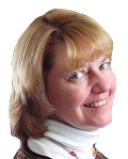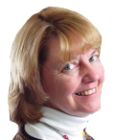
Divorce
The Power of a Name
What do you do when your passport is marked VOID?
Posted September 2, 2011
I am not one of those people who knew from age 12 what she wanted to be. In college, I had two inspiring professors of anthropology and their classes started a lifelong fascination. When I graduated from college, I took a job at a publisher in NYC where I had had a summer internship.
I married shortly after graduating, and my husband and I left on our honeymoon using a passport I had obtained as a single woman, in my maiden name (Shipman). We married in 1970, during the rise of the feminist movement. The question whether or not to take my husband's name was a serious choice. I decided to be traditional.
That meant I had to take my passport in for amendment after the honeymoon. On the crucial page - the one with name, birth date, and photo ---- the Passport Office took a large red stamp and marked VOID VOID VOID all over it. Then someone added a handwritten note: "See page 8." On page 8 was a notation that my name had been changed on a particular date.
I thought I'd get used to his name, but I didn't. I jumped every time people referred to me as Mrs. So-and-so, because that was my husband's mother: a nice lady, but not me. I mis-signed documents and letters repeatedly because I was unused to my new name, which meant I had to type them over (no computers then and I certainly didn't have a secretary to do my typing). I hesitated to identify myself on the phone. For a while, I tried using Shipman as a middle name & my husband's name as a surname, but that got pretty cumbersome. I felt like an imposter.
My husband went to a demanding professional school, working long hours and weekends, while I brought in the meager bacon. After a while, I quit my job and started graduate school in anthropology, with the financial assistance of my parents and later a fellowship. Three years after marrying, my first husband and I divorced.
The brightest ray of light was that I got my own name back. I was Pat Shipman again.
I loved graduate school and did well. I was becoming me, not an extension of someone else, and my future would be determined by me. That me was working hard to become an anthropologist and to get over the sadness and loss of the divorce.
I completed my coursework and researched my M.A. in Ethiopia, a glorious and strange African country. I passed my comprehensive exams well. (Comps are the much-dreaded "hoop" that graduate students in many programs must jump through in order to be admitted to candidacy for the Ph.D. They measure if the student knows the fundamental facts, theories, and arguments of the field.)
Proud of the changes in my life, I took my passport back in to the Passport Office and had it amended again to reflect the divorce. When I got it back, I took a look. On the opening page, it still said "VOID VOID VOID see page 8" but on page 8, there were new notations. The same stamp appeared - VOID VOID VOID - and a small handwritten notation, "See page 10." On page 10 was an office note that my surname had been changed again to Shipman, on such-and-such a date. I breathed a sigh of relief but I didn't think about the larger implications.
I should have. I had learned in anthropology courses how very important names are. Specific customs vary widely, but many groups believe that if you know someone's name, you have power over them. So, for example, Navajo do not refer to other family members by their personal names but by their position in the family, using "son" or "mother" instead of the name. If you act in someone's name, you are borrowing their authority or power: "In the name of the King, I hereby..." In much medieval folklore - and the Harry Potter books -- the devil and magical creatures can be summoned up by those who know their name. Names are so powerful that, among many ethnic groups, a child is not given his or her real name until well after birth to protect the newborn child from curses. And commonly, new names are given to mark entry into a new phase of life.
On my next trip to Africa, I was going to be a volunteer on a dig in western Kenya. I needed to find a thesis topic and my adviser had begged, pleaded, & arm-twisted in order to get me a place on that dig, which was being run by a colleague with whom he had been at grad school. My adviser promised that I would pay my own way, do whatever I was told, not make trouble, and get on the first bus back to Nairobi if I was in any way a bother. He also said, I found out later, that I was very bright but that I "came on a bit strong," which has been a joke phrase in my family ever since.
Going into Kenya, exhausted by the two days of travel but exhilarated by being back in Africa, I hit an unexpected snag. I already knew that officials in Third World countries can be difficult; some of them simply enjoy demonstrating their power over foreign tourists. Others resent their low pay and difficult lives compared to the apparently rich visitors they see every day. And many are embedded in a rigid bureaucracy, which makes them very uneasy with anything that is not usual, that might require an independent decision for which they might later be criticized.
I approached the Passport Control officer, smiled and greeted him, and handed over my passport. Then I waited. And waited. He opened the passport, reading every item on the opening page and looking with alarm at the VOID VOID VOID stamps. (Oh no, I thought.) Then he turned, very slowly, to page 8, and read page 8 very carefully and slowly, several times. Then he went back to page 1 and reexamined it. Then he went back to page 8 and read it again. Finally, he went to page 10 and read it. I was sweating from anxiety but I strove to appear calm, pleasant, and unthreatening.
The officer returned again to page 1, comparing it with page 10.
He looked up at me and said, "I see. Back to square 1." He smiled, then paused and cocked his head. "But why?"
"My father has no sons," I said.
"Ah!" The official exclaimed, beaming as he wielded his rubber stamp on the three vital pages of my passport and his ink pad -- squish, thump, squish, thump, squish, thump. He handed the passport back to me.
As I walked away, I thought about what had just happened. I had given the official an answer he could understand and appreciate. When I said, "My father has no sons," I was speaking a profoundly important truth in Kenyan culture and in mine Maybe honoring my father was why I felt the need to hang on to my own name.
I had become an anthropologist.

